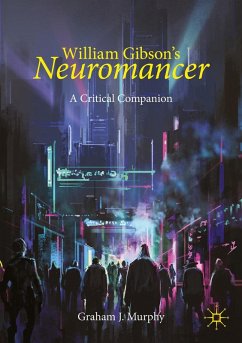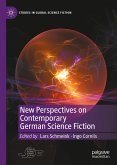Graham J. Murphy demonstrates his bona fides as an expert reader of cyberculture in this study of William Gibson's hugely consequential first novel, already canonized as one of the late twentieth century's most influential expressions of technoculture. Murphy's concise and nuanced analysis looks at Neuromancer through a variety of critical lenses and, in the process, very usefully addresses issues such as gender, embodiment, and the posthuman that have sometimes been over-simplified in earlier readings. Riffing on Fredric Jameson, he concludes that Neuromancer is "the supreme literary expression of capitalist realism," set in a future-present that seems increasingly to mirror our own moment. Murphy convincingly makes the case for Neuromancer's ongoing relevance to a present scarred by eco-crisis and hyper-globalization. -Dr. Veronica Hollinger, Science Fiction Studies
William Gibson's Neuromancer: A Critical Companion offers everything you could hope for from such a volume, and more. Graham J. Murphy not only provides historical and critical contexts, citing an impressive array of sources, but also offers an authoritative and insightful reading of the novel that makes significant contributions to an understanding of what the book is actually about and how it remains chillingly relevant today. One does not typically expect original insights in a companion volume, but Murphy offers several highly persuasive ones here. Accessible and engaging, this book has much to offer anyone interested in Gibson, from advanced scholars to undergraduate students. Essential reading. - Dr. Dominick Grace, Non-Fiction Reviews Editor, SFRA Review
Graham J. Murphy had had his own cyberpunk implant, and like many of us it's a Gibson augmentation. You can upgrade yours by reading this ecstatic account of how William Gibson's Neuromancer does what it does. Murphy matches Gibson's super specificity with his own, keenly detailing the cultural factors that shape cyberpunk and Neuromancer. The range of scholarly references here indicate the importance of Gibson's novel as much as Murphy's seriousness about representing the discourse. Read it, teach it, cite it. - Dr. Brent Ryan Bellamy, Trent University
William Gibson's Neuromancer: A Critical Companion presents Gibson's rise as an influential figure within and beyond the science fiction field. Gibson's success with Neuromancer, the first novel to win the Hugo Award, Nebula Award, and Philip K. Dick Award, is in part a direct result of the rising popularity of cyberpunk in the early- to mid-1980s, although it could just as easily be said cyberpunk's success was in no small part a direct result of Neuromancer's explosion onto the science fiction scene.
Neuromancer's ongoing relevance remains undiminished because we are effectively living in a technocultural age that is increasingly difficult to distinguish from Gibson's novel. As Graham J. Murphy demonstrates in this companion, the novel remains instrumental in thinking through the ongoing explorations of the posthuman: transhumanism, the Utopia/Anti-Utopia dynamic, and capitalist realism, to name a few of the more significant critical vehicles with which to better understand and contextualize our technocultural age and Neuromancer's role in both shaping it and responding to it. This book provides a critical introduction to Neuromancer and cyberpunk culture.
Graham J. Murphy is Professor with the School of English and Liberal Studies, Seneca Polytechnic, Canada. He is co-editor of Fifty Key Figures in Cyberpunk Culture (2022), The Routledge Companion to Cyberpunk Culture (2020), Cyberpunk and Visual Culture (2018), and Beyond Cyberpunk: New Critical Perspectives (2010) and co-author of Ursula K. Le Guin: A Critical Companion (2006).
Dieser Download kann aus rechtlichen Gründen nur mit Rechnungsadresse in A, B, BG, CY, CZ, D, DK, EW, E, FIN, F, GR, HR, H, IRL, I, LT, L, LR, M, NL, PL, P, R, S, SLO, SK ausgeliefert werden.









